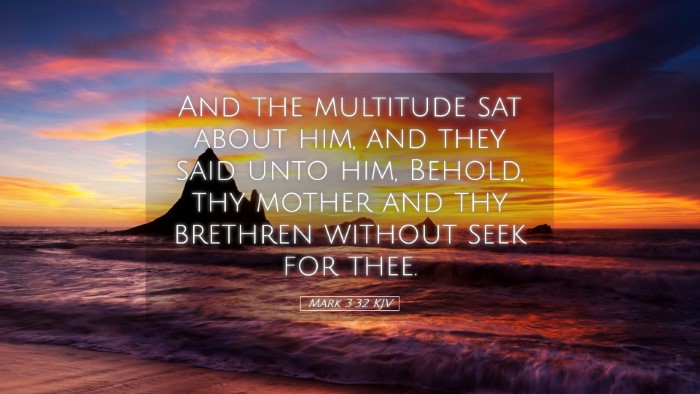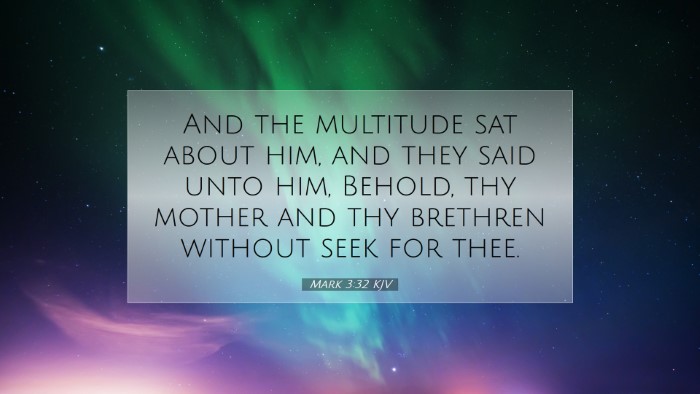Commentary on Mark 3:32
Mark 3:32: "And the multitude sat about him, and they said unto him, Behold, thy mother and thy brethren without seek for thee."
Introduction
This verse introduces a significant moment in the earthly ministry of Jesus, illustrating both the physical and spiritual dichotomies that occur within His ministry. The crowd's attention to Jesus stands as a testament to His teachings and miraculous works, while the mention of His family shifts the focus to the nature of familial relationships in the context of discipleship.
The Context of the Passage
The context surrounding Mark 3:31-35 is critical for understanding its implications. Jesus had just engaged in a series of confrontations with religious authorities and was involved in healing and teaching, drawing large crowds of people who were eager for both physical and spiritual healing. In the midst of this, His family arrives seeking Him, which raises questions about loyalty, identity, and the cost of following Christ.
Insights from Matthew Henry
Henry emphasizes that the multitude sitting about Jesus signifies the drawing power of His ministry. "The attention of the people," he notes, "was remarkably upon Him, indicating that His words held authority unlike any others." This reflects the spiritual hunger of the people and the profound impact of Christ's message.
Albert Barnes' Perspective
In his commentary, Barnes elaborates on the familial conflict that arises in this passage. He states that the mention of Jesus' mother and brothers seeking Him highlights a struggle between earthly relationships and spiritual commitments. "Even in His own household, Jesus faced misunderstandings about His divine mission," Barnes writes, suggesting that His earthly family may not have fully grasped His messianic identity.
Adam Clarke's Analysis
Clarke provides a deeper insight into the social implications of family and community in the Jewish context. He quotes significant rabbinical teachings which stress the importance of familial bonds. However, he draws attention to how Jesus redefines these connections, demonstrating that "true kinship is found among those who do the will of God." Clarke asserts that the priority of the spiritual family overshadows the biological one when it comes to following Christ.
Theological Implications
This verse presents profound theological themes that resonate through the entirety of Christian thought. The call to discipleship is inherently a call to prioritize spiritual commitments, often at the expense of worldly relationships. The significance of the crowd's actions, juxtaposed against Jesus' familial relationships, invites both pastors and scholars to reflect on the nature of true commitment to Christ.
Re-examining Family Ties
The moments captured in this passage compel readers to evaluate how familial duties can sometimes conflict with spiritual obligations. Jesus introduces a radical new framework where following Him may involve alienation from one’s biological family. Yet, it also offers the promise of a spiritual family that surpasses earthly affiliations.
Application for Today’s Believer
This text challenges contemporary believers, especially as they navigate relationships within both the church and their families. It prompts us to consider: "What does it mean to follow Christ amidst family expectations?" The answer lies in prioritizing God’s will over human allegiances, fostering a community centered on obedience to Christ.
Conclusion
Mark 3:32 serves as a lens through which we can examine the complexities of Jesus’ ministry and the radical redefinition of family in light of His mission. It powerfully illustrates the essential call to discipleship, emphasizing that our allegiance to Christ must transcend even our deepest familial ties. By embracing this teaching, believers can find true belonging in the family of God, where every member is united in faith and purpose.


